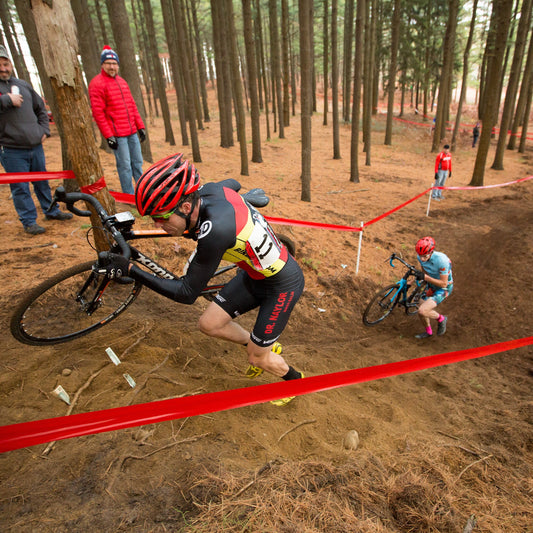Mental Aspects and Strategies
It is often thought that as athletes, and specifically triathletes, if proper attention is paid to our training, nutrition/restoration, race fueling, and race pacing that we will just naturally race to our potential. We, at QT2 Systems, consider these to be our four cornerstones of success. But, often is the case that we do not race to our potential, despite tremendous fitness. When this occurs, a probing analysis must consider all aspects of our preparations/execution, including the four cornerstones, and perhaps something deeper still. This adds a layer of complexity to the performance package, as our foundation of cornerstones becomes pentagonal, and much, much more complicated. This fifth element, mental fitness, is the least tangible of the cornerstones, and therefore the most difficult to wrap our hands and minds around. The original four cornerstones all have basis in the hard sciences that study human physiology which, though always being refined, are universally well-understood. The introduction of mental fitness brings with it a level of abstraction, because it deals with the human mind, and despite tremendous gains over the last century its scientific ramifications have not yet been fully defined.
Despite an incomplete understanding of the human mind, and how it works, enough research has been done in the area of athletic performance to determine the appropriate strategies needed to overcome mental limitations, as they arise. Let's consider just a few…
The First Line of Defense
When an athlete does not perform up to expectations, based upon training indicators, the first and foremost places to inspect are the day's race fueling and execution/pacing. These executables are, invariably, the most common areas where athletes who have subpar performances struggle. These executables, combined with more than adequate preparations (training and nutrition/restoration), form our four cornerstones of successful race performances. Any missing piece can result in races that do not meet our expectations. And, the longer the race, the greater negative effect that any single missing component will have. But, it is when all four of these pieces are firmly established, in place, and we still miss our expectations, that we are left scratching our heads in wonderment.
In steps mental health, to form the basis of our fifth cornerstone. As we all know, without good physical, systematic health, it is difficult if not impossible to create physical fitness, which results in speed. Well, the same holds true on the mental side of the equation. Good mental health is required, for an athlete to develop or maintain strong mental fitness, and thus speed.
What Is Mental Fitness, and Why Is It So Hard To Come By?
Competition in and of itself is quite a daunting proposition! In it, you avail yourself to comparisons against others, within a confined set of rules. Your abilities, be they strong or weak, are put forth to be judged. This can be a tremendous undertaking for the human ego! How an athlete perceives the environment of the competition, and how it makes them feel is fundamental to mental fitness. Those with strong mental fitness can adapt to any setting, and either take full advantage of it or, at the very least, be completely unaffected by it. At its most basic level, take for example this year's Ironman Lake Placid. On the morning of the event it was announced that it would be a non-wetsuit swim, for those competing for a Kona slot. Those with strong mental fitness were able to recognize that this was the hand that they had been dealt, and though it might result in a slower swim time, would leave their race primarily unaffected. Others panicked! In essence, the key components of mental fitness really boil down to the following during competition:
- Failure - Very little fear of it.
- Goals - Not thinking about performance outcomes.
- Focus - Being "in the moment" and focused on the activity at hand.
- Experience - Having your body just complete the task almost involuntarily.
- Control - Sticking to your executables, and staying within your targets creating great sense of personal control.
Motivation
Intrinsic motivation is one of the most important attributes of mental fitness, and can best be described as the athlete's desire to train and compete, on a daily basis. An athlete's "love of the game" will typically fuel the desire to be competent and self-determined in their respective sport. This tends to be second nature to most triathletes, otherwise why would we sign up for races a year in advance and get up at ungodly hours of the morning to train for them. But, when this intrinsic motivation begins to wane, there is very often a bigger picture issue related to either physical or mental health, such as overtraining and depression, respectively. As a result, it is quite possible to be both intrinsically motivated and lacking in mental fitness. Their mutual exclusivity is the very reason for this discussion, and what constantly bewilders coaches and athletes alike.
Task Relevance
Task relevance considers an athlete's mindset while training and/or racing. Athletes who are able to focus their full attention on task relevant items, be they training or racing, are constantly reminding themselves of things such as "I will stay focused on the bike, and peddle at 90rpm" and "I will run this hill strong, keeping my eyes on my target". These are signs of a mentally fit athlete because, despite any outside distractions, they are able to concentrate only on the task at hand. Conversely, the mentally unfit athlete will tend to allow themselves to be distracted by outside stimuli, thus focusing on task irrelevant items. A looking glass into their minds might reveal thoughts that fall along the lines of "If I don't perform well, I am going to disappoint my family and friends" and "If I don't place in the top-10, my sponsors are going to drop me". The difference in mindsets is quite clear, and it is not too difficult to see the positive impacts of one, and the very negative impacts of the other. While a focus on task relevant items will not necessary lead to physical success, it will certainly put the athlete in a position to fully capitalize on their fitness. By the same token, the toll of focusing on task irrelevant items can take the wind right out of an athlete's fitness sail, so to speak, as too much mental energy is spent on why something can't be done, rather than why it can.
Athlete Arousal
For those of you snickering like a 15-year old boy in the back of the classroom, "arousal" is actually a common term used to describe the level of excitement that an athlete is able to bring to an event or workout. Athletes should work to identify their optimal arousal level, such that they are neither a jittery mess, nor a wet mop at the starting line. Athletes want to make sure that they are aroused enough to push themselves to their physical limits on race day, but not so much so that they begin making mistakes and focusing on task irrelevant items. To this end, caffeine or other mental stimulus can play a very important role in reaching the proper arousal level. Finding thoughts to reduce arousal level in some athletes, and thoughts to increase it in others is an important component to mental fitness.
As we all know, caffeine is one of the most effective ergogenic aids available. Its use in endurance sports has been extensively studied mostly from a physiological perspective. Here, I discuss its use relative to mental fitness. Caffeine is a stimulant of the central nervous system and has an excellent record of increasing alertness and decreasing perceived exertion. For this reason, athletes who tend to have a bit of trouble reaching the arousal level necessary to fully push their fitness limiters can consider its supplementation. On the very opposite end of the spectrum, those who have little trouble reaching appropriate arousal levels should potentially avoid its use, perhaps until later into an event if at all. Caffeine use in these athletes will, more likely than not, lead to over arousal which can lead to task irrelevant thinking.
When it comes to mental fitness, there are typically two primary types of athletes. There are those who are motivated by the avoidance of failure, and there are those who are motivated by the achievement of success. Few can be fully classified as either one or the other, so we should consider how best to approach each, and then apply differing tactics across athlete types. Just as optimal physical fitness is a highly personalized undertaking, mental fitness is equally as individual. What's good for the goose may not be so good for the gander.
Motivation: The Avoidance of Failure
Athletes who are motivated by the avoidance of failure (MAF), will typically perform best in events that are perceived to be either very, very easy or very, very hard. These athletes will thrive at local sprint races, where the competition is perceived to be very weak, or in a race like Kona, where they perceive the competition to be head and shoulders above themselves. But, at a regional championship, or satellite Ironman, where the perception of success is 50/50, they will talk themselves right out of a potential Kona slot. As a result, these athletes should stay away from caffeine, as they tend to become over-aroused, very easily, and begin to focus on task irrelevant items. This is a shortcut to the following thought process:
- The environment is perceived to be a threat to self-esteem
- A disconnect between ability level and what is required for perceived success
- A fear of consequence from coach, sponsors, or peer group.
And so begins a nasty cycle of mental cat and mouse, as these thoughts lead to further and further arousal, for an athlete who doesn't need it. Successful MAF athletes will focus their attention on process goals, and their coaches will work to mold the athlete's perception of an upcoming event as either very easy, compared to their training, or as nearly impossible. These athletes can be negatively affected by too much detail in their training program. Seemingly benign information, such as tracking nutritional intake, or assigning exact power and pacing numbers for a race can quickly overwhelm the MAF athlete, because each represents an opportunity for the perception of failure, and subsequent focus on task irrelevant items. As a result, a training program that is less focused on detail and metrics can be the best approach for these athletes. Although detail in all aspects of a training/nutrition program is a hallmark of quality coaching, physical progress is of little value to an athlete, if it cannot be utilized on race day. In the end, there is only one true metric of success, in competitive racing: how quickly you are able to cross the finish line.
As an extremely detail-focused coach, MAF athletes certainly require a great deal of caution, for me. Too much detail can lead these athletes to believe that inconsequential items can have tremendous race day impacts. For example, we typically assign the exact timing and portion size of a race morning breakfast, based upon the race's distance. MAF athletes may overreact to missing the timing of their breakfast by 10 or 15 minutes, by perceiving because they have made this mistake that they have little, to no, chance of performing in a competitive way. The MAF athlete assigns 20% importance to something that is deserving of only 0.5% importance. In the end, the focus that both the athlete and coach place on 0.5% items, despite being physiologically and nutritionally sound, may actually be greatly detrimental because of the way the athlete perceives the mistake. It is a matter of perception, and if a particular level of detail is going to create the perception of failure, then it is simply not worth it assuming its miss isn't detrimental to physical performance. Because of my focus on detail and metrics, I have made these very same mistakes, and have seen athletes at the peak of their fitness not perform up to expectations on race day. Left scratching my head, I began considering the importance and effects of the mental game, and what I call "mental fitness". Though a significant paradigm shift, what I found begged the question: why focus on SO much detail, if it undermined the athlete on race day? Why not focus on less detail, and take a more qualitative approach to their preparations and race day execution? As the athlete's mental fitness develops, then more and more detail can be introduced into the fray. Remember, it doesn't matter what the reality actually is, it's much more about how the athlete perceives the situation. I encourage athletes to think about the how they let their environment make them feel; this is at the pinnacle of mental fitness.
Motivation: The Achievement of Success
Athletes who are motivated by the achievement of success (MAS) perform very well when they perceive success to be 50/50. They "want the ball", when the game is on the line and are able to rise to the challenge defined by how they perceive their environment. Regardless of the reality, if these athletes perceive a challenge, they embrace it. When faced with a 50/50, the MAS athlete can summon the optimal arousal level, leaving them focused and motivated to perform as their fitness suggests. The MAS athlete responds very well to detail, and tends not to perceive "failure" as detrimental. Rather, they maintain perspective of the details, in relation to their training as a whole, better perceiving the reality of each. The MAS athlete knows that missing the timing of their race morning breakfast by 10 minutes, really isn't a big deal in the grand scheme of things.
Caffeine may be a serious consideration for the MAS athlete, who may sometimes struggle to reach the arousal levels necessary for optimal performance when the environment is perceived to be overly easy, or overly hard. Unlike the MAF athlete, who can be sent over the edge by caffeine, the MAS athlete may employ it for both, best effort workouts and races, alike when there is little outside challenge to the task. At times, the MAS athlete may require a bit of help to concentrate their efforts on the importance of a key workout, or a local sprint race where they know they will win. Where the MAF athlete can be a bit too much like the Tasmanian Devil on race morning, the MAS athlete can too closely resemble Deputy Dog depending on the situation. Deputy Dog is going to require some caffeine to get through a set of mile repeats, at a best sustainable effort when there is very little outside stimulus!
Support Systems
Coaches typically fall into two categories. There are those who use positive reinforcement to motivate their athletes, and those who use punishment. 99% of the time, positive reinforcement is the most productive approach, with punishment only used sparingly. Most coaches, and family support systems, fall somewhere in between these two approaches. Punishment can be extremely detrimental to the MAF athlete, because it causes them to further focus on task irrelevant items, and reinforces their fear of failure. This can catalyze the cycle of negativity discussed above. MAS athletes, on the other hand, can sometimes react positively to some punishment in their program, as they tend to perceive it as a challenge. It is very rare that a coach will be successful utilizing either model, exclusively. Coaches, and support systems should consider the athletes who they are working with, and gauge their approach accordingly. An approach heavily weighted in the punitive model should be used cautiously, and only for those athletes who the coach knows will view the punishment as an opportunity to rise above it.
While many coaches are who they are, and take the approach that best suits their personality, I urge coaches to allow their approaches to be more athlete-centered than coach-centered. This may require the coach to wear more than one hat, but will ensure that their athletes are able to maintain an appropriate mental approach to training and racing. Just as a good teacher must consider how best to motivate each individual student, a good coach must do the same. Positive reinforcement is never the wrong answer. But sometimes, when you need a little more emphasis, to get your message across, punishment can be a very effective tool, specifically for the MAS athlete. Where the MAS athlete can typically handle some level of reprimand, the MAF athlete may feel alienated by it. This can result in a poor athlete/coach relationship, culminating in hostility and/or discouragement. For the MAF athlete, this can create a loss of motivation, with a renewed focus on failure.
Conclusion
When corresponding with an athlete, be it by phone, email, or in person I first think about the type of athlete I am dealing with, relative to the athlete types outlined above, and then frame our discussion around how the athlete will best respond. All but a very few athletes are neither 100% MAS, nor 100% MAF, and where they fall on the spectrum can vary on a yearly, monthly, and even daily basis. As a result, I adjust my approach accordingly. Once you are able to understand the athlete's state of mental fitness, you can better guide their performance on race day, with the goal to always display the fitness they have developed and shown in training.
MAF athletes require a focus on developing a more positive motivation process. Utilizing MAS specific tools on the MAF athlete can be detrimental, and actually cause them to focus on failure, more so than anything else. Punitive practices, caffeine usage, too much detail in the training program, and the forced environment of "stepping up" to perceived 50/50 opportunities are all examples of what can derail the mindset of the MAF athlete. As coaches and athletes we place the bulk of our attention on the physical aspects of the sport, and for good reason. But, when we find ourselves, or one of our athletes, not performing to physical expectations, we must take a step back and consider this additional sphere of influence. The sport of triathlon is multi-faceted, and as a result, we are always presented with any number of potential limiters. Like the physical, limiters in mental fitness can be just as restrictive. Remember, that each athlete is an individual; that each athlete interprets their environment according to their own perceptions. Just as we would never expect each athlete to respond to exactly the same physical stimuli, we cannot expect each athlete to motivate in kind. I believe this is one of the reasons why many triathlon squads that take a standard approach to all athletes from a mental perspective can be successful for some, but detrimental to others.
-Jesse





